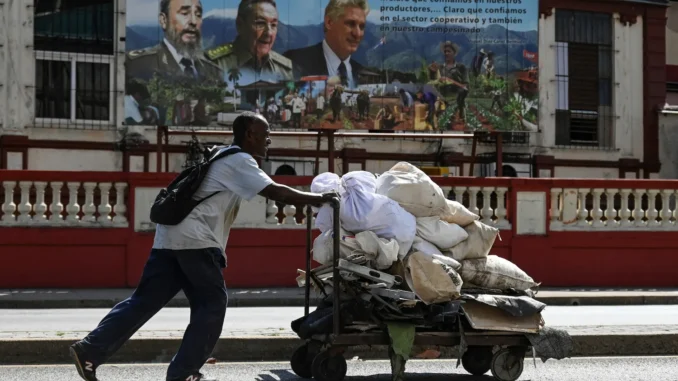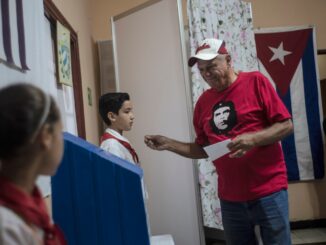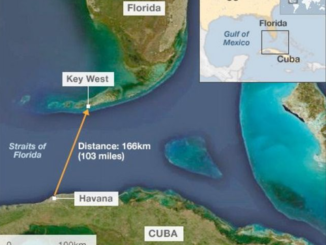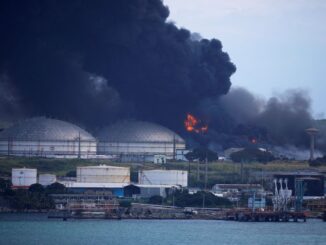
The country is experiencing its worst economic crisis since the end of the Cold War.
Cuba on the Brink
Last weekend, demonstrators filled the streets of at least four Cuban cities in rare protests. They called for food and electricity provisions amid widespread shortages throughout the country. Some shouted “patria y vida,” or “homeland and life,” a chant that emerged during the last major anti-government marches in July 2021.
Authorities cracked down hard on the 2021 demonstrations, and many protesters remain jailed even today. The current protests saw an unconfirmed number of demonstrators arrested, according to human rights groups. On Sunday, officials distributed rice, milk, and sugar in one of the cities that saw demonstrations, perhaps an acknowledgment that participants’ complaints were legitimate. It is unclear whether the protests will continue.
Cuba’s economy has not fully recovered from the COVID-19 pandemic and in fact has dramatically worsened since the 2021 protests. Currency reform that year led to continually high inflation, and communist Havana has stumbled in attempts to open its controlled economy to the private sector.
The Biden administration has also maintained some Trump-era economic restrictions on Cuba and delayed plans to build links between the Cuban and U.S. private sectors amid congressional opposition. Meanwhile, Cuba’s historic economic sponsors—including Venezuela, China, and Russia—have been unable or unwilling to sweep in with bailouts.
The result is that Cuba is experiencing its worst economic crisis since the years following the 1991 collapse of the Soviet Union, its then-sponsor. The ongoing turmoil has spurred mass emigration: In the two-year period ending in September 2023, more than 4 percent of Cuba’s population either arrived in the United States or applied for asylum in Mexico, according to the Washington Office on Latin America.
Cuba’s government often blames its economic troubles on U.S. sanctions. In 2018, a United Nations agency estimated that the U.S. embargo on Cuba—imposed in 1962—had cost Cuba’s economy some $130 billion. The Trump administration took further punitive steps, restricting remittance flows between Cuba and the United States and designating Cuba a state sponsor of terrorism, which complicated the country’s integration in international markets.
The fresh demonstrations show that Havana’s role in the economic crisis has become more central in the public eye, University of Miami historian and Cuba expert Michael Bustamante told Foreign Policy. “Cuban citizens, more and more, don’t buy the Cuban government pointing its fingers outside, and they are looking squarely at their own officials to take ownership and responsibility,” he said.
Whether negative public opinion can lead to political change is another question. U.S. proponents of economically isolating Cuba have long argued that misery on the ground could bring down the communist government. But if the post-Cold War shock of the 1990s is any indication, Cuba’s political system may be able to ride out the current conditions.
Cuban policymakers have for decades resisted loosening the state-controlled economy, only moving slowly to do so in recent years. Last December, Prime Minister Manuel Marrero Cruz admitted that Havana had not allowed the economy to diversify sufficiently. But he did not present a vision for how this diversification would occur and instead simply removed price controls. That move ultimately worsened household suffering.
U.S. President Joe Biden, for his part, has yet to fulfill the campaign promises he made on Cuba policy. In 2020, Biden pledged that he would roll back the Trump-era policies “that inflicted harm on Cubans and their families.” Yet he has only partially followed through. The president’s changed stance is apparently aimed at appeasing Cuba hawks, whether in the U.S. Congress or the electorate.
The Biden administration’s approach to Cuba stands in contrast to its policy on Venezuela, where the United States has lifted sanctions that were part of Trump’s so-called maximum pressure strategy. Although other factors—such as major oil reserves and upcoming elections—were at play in Venezuela, administration officials also recognized the harm that sanctions caused to civilians.
Latin American leaders have called on Washington to fully reverse Trump-era restrictions in Cuba, too, but have so far been unsuccessful. Cuban policymakers continue to be key drivers of citizens’ economic pain. But Washington also bears responsibility, Bustamante said. Current U.S. policy “has fed a mass migration that you’d think the Biden administration would be doing everything to try to stop.”



